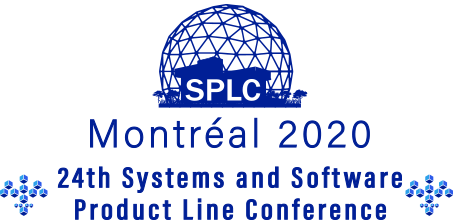Announcement. We are glad to announce that PhD students who get their papers accepted in the Doctoral Symposium and that are student members of ACM will receive free registration to all SPLC events. Please consult the details of ACM student membership here.
CONTEXT
The SPLC Doctoral Symposium aims to provide a supportive environment that enables doctoral students to get constructive feedback on their research. Students will have the opportunity to discuss their work with experienced members of the community. Thus, the symposium offers a unique opportunity to gather valuable expert feedback and to get in touch with peer students in the same field. The event is dedicated to PhD students who are least in the second year of their candidature, presenting initial results that are not yet mature enough for a full conference paper. The SPLC doctoral symposium covers the same research topics as the main conference.
IMPORTANT DATES
We extended the deadlines due to COVID-19, the new deadlines are firm:
- Paper submissions:
June 5, 2020July 6, 2020 - Notifications:
June 26, 2020July 24, 2020 - Camera-ready papers:
July 3, 2020August 7, 2020 - Conference: October 19-23, 2020.
Requirements
To participate, students should prepare a research plan answering the following questions:
- The research problem being addressed and its importance
- The research methodology and techniques being applied
- The solution being proposed, its novelty and validity
- The relation of the work with the state of the art
The idea of the research plan is to provide clear material that can be used as a basis for guidance and discussion. Therefore, students should think about the above points carefully and try to make their ideas as concrete and clear as possible. Students at relatively early stages of their research may find it difficult to address some of these points, but should still attempt to do their best. It is strongly recommended that students discuss the research plan with their supervisors.
The following structure is recommended:
- Front matter: Title, your name, email address, abstract
- Introduction and Motivation: Introduction to the area of study; description of the problem tackled and its importance; what the literature says about this problem and where existing work fails; how you plan to tackle this problem; what results you envision; how you plan to validate your solution.
- Research Questions: Clearly state the research questions you plan to address and any assumptions you take.
- Research Methodology and Approach: The research methodology you plan to use (e.g. design science, action research), including the techniques you plan to employ in your research (e.g. formalization, algorithm specification, case studies). In accordance with your research methodology, describe your research approach: what novel methods and/or technology you are going to build, how you are going to do that, including aspects such as data collection, software prototyping and evaluation. Discuss any threats to validity you may envision.
- Preliminary Results: Overview the key results achieved so far. Provide an example to explain how the solution obtained so far works – this is very important!
- Work plan: Outline the structure of your thesis, distinguishing the work accomplished so far from that remaining, incl. a publication plan. Also provide a detailed work plan for the next 12 months.
Submissions should be 8 pages maximum, in ACM SIGS proceedings format (tighter style). All submissions must be in English, in PDF format, and must not contain or cite proprietary or confidential material. The research plan should be sent as a single file via Easychair track Doctoral Symposium: submit here.
\documentclass[sigconf]{acmart}
\acmConference[SPLC'20]{24th ACM International Systems and Software Product Line Conference}{19--23 October, 2020}{Montreal, Canada}
Submissions will be evaluated by two reviewers according to relevance, originality and feasibility of the described research.
CHAIRS
PROGRAM COMMITTEE
- Timo Kehrer, Humboldt-Universität zu Berlin, Germany
- Klaus Schmid, University of Hildesheim, Germany
- Oscar Díaz, Basque Country University, Spain
- Rick Rabiser, Johannes Kepler University, Austria
- Jocelyn Simmonds, University of Chile, Chile
- Iris Reinhartz-Berger, University of Haifa, Israel
- Bruce Watson, Stellenbosch University, South Africa
- Malte Lochau, TU Darmstadt, German


